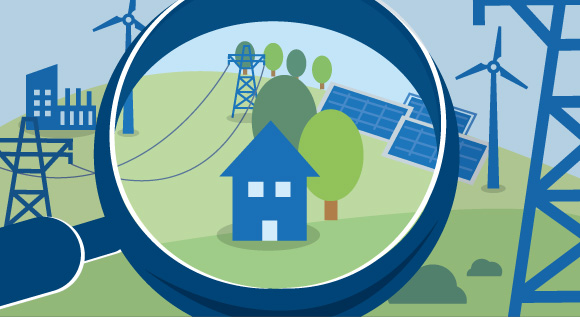What exactly is ‘hydraulic balancing’?
With some heating systems, it doesn’t matter just how high you turn up the radiators – one will barely heat up at all, another will be too hot. Sound like a familiar problem? If so, you should treat your heating system to a course of hydraulic balancing. This will not only resolve the problem of uneven heat distribution, it will also be a cheap way to help you save a great deal of energy and money.
 © BMWi
© BMWiAiming for energy conservation and even heat distribution
Buildings account for almost 35 per cent of our final energy consumption in Germany, with most of this energy going on to be used for heat and hot water. Too much of this energy is still being wasted. ‘Hydraulic balancing’ can help us use and conserve energy in a better way and heat our rooms to a nice and cosy temperature. But how exactly does it work?
Unless the overall heating system is correctly balanced, radiators that are located further from the boiler won’t heat up properly, whilst the radiators closest to the boiler become too hot. This won’t just make your home uncomfortable, it also means you’re wasting energy.
Hydraulic balancing is a process that involves a specialist firm coming to adjust the heating system to ensure that each radiator gets just the right amount of the hot water circulating in the pipes.
Balancing is a three-step process
This is done in three steps. As a first step, the firm will assess just how much heat each room needs. This depends on the particular properties of the house or flat, i.e. on the level of insulation of the outer walls and on the type of window fitted. As a second step, the firm will calculate the correct amount of hot water that needs to be pumped into the radiators and the right settings for the pump. This data is then used to fine-tune the valves of each individual radiator. Once the process has been completed, each radiator will receive just the correct amount of heat needed to heat up the room to the desired temperature.
How to tell if your heating system needs to be balanced: watch out for gurgling, whistling or white noises
There are several signs that indicate that your home heating system needs to be balanced. If you find, for instance, that you can’t adjust your heating as well you’d like and that the rooms won’t heat up properly, hydraulic balancing might be the answer to your problem. Or does your heating make gurgling, whistling or white noises? Are some radiators hot, even on a low setting, whilst others will hardly heat up at all, even though they are on full? These are all signs that your heating system might be in need of hydraulic balancing.
It takes just a few hours
In most cases, the process of hydraulic balancing won’t take longer than a few hours. After completing the three steps set out above, the firm will then check the overall result and the process is all done. In some cases, your heating system might need some minor repairs such as new valves.
The exact cost of the process will depend on the way your heating system is set up and what kind of state it is in, as well as the number of rooms and the overall size of the building. As a rule of thumb, you can expect to pay something like 500 euros for a single-family home. Specialist firms will be happy to give you a quote. In most cases, you will recover the cost of the process within just a few years, because you will spend less money on heating.
Save even more by having your entire heating system modernised
Anyone looking to modernise their heating system will be eligible for a government grant. The government will cover 30 per cent of the cost of the course of hydraulic balancing and of any associated work, such as new valves. Under the new funding programme for work to optimise heating systems, grants are also available to those who swap their outdated heat pump for a new one. In many cases, having both measures done at the same time will produce the best outcome and save you the most money. A government grant of 30 per cent is available to anyone who has a highly efficient heat pump fitted.

